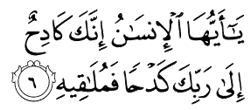Hard Labour, Edicts and Judgements, Hagar-like Deeds
Issue 910 » September 2, 2016 - Dhul Hijja 1, 1437
Living The Quran
Hard Labour
Al-Inshiqaq (The Rending) - Chapter 84: Verse 6
 "O
man! You have been toiling towards your Lord, and you shall meet Him."
"O
man! You have been toiling towards your Lord, and you shall meet Him."
Man certainly labours hard in this life, shouldering his responsibilities and exerting himself. All this he does in order to return, in the end, like all the rest of creation, to God. Man labours even for what he enjoys! Nothing in this life comes easily or without effort: if sometimes no physical labour is needed, then surely some mental and emotional effort is required. In this the rich and poor are alike, although the labour exerted may differ in kind and form.
This address reminds man that labouring hard is the lot of all in this life on earth. But when we meet our Lord, we will fall into two groups: one will suffer hardship incomparable to that suffered on earth; and the other, consisting of those who have demonstrated their obedience and true submission, will enjoy a rest in which the suffering of this life will be forgotten.
Compiled From:
"In The Shade of The Quran" - Sayyid Qutb, Vol.18, p. 96
Understanding The Prophet's Life
Edicts and Judgements
[continued from issue 909]
2. Issuing Edicts (fatwa)
The capacity of issuing edicts has signs such as the report mentioned in Muwatta and the authentic collections of Bukhari and Muslim on the authority of Abd Allah ibn Amr and Ibn Abbas that, during the farewell pilgrimage, the Prophet (peace be upon him) stopped for people at Mina, and they asked him about different matters, while he was still mounted on his she-camel. A man came and said to him: "I sacrificed before throwing the stones." He advised: "Throw, and don't worry." Then another came and said: "I shaved before sacrificing", and the Prophet answered him: "Sacrifice, and don't worry." He was not asked about anything that one would, out of ignorance or forgetfulness, do after or before without his saying, "Do it, and don't worry."
3. Adjudication (qada)
The capacity of judgeship refers to what emanates from the Prophet when settling disputes between people. Any action of the Prophet performed without the presence of adversaries is not classified as an instance of judgeship. One of the indicators of the capacity of judgeship is the explicit statement of the adversary: "judge between us" or the Prophet's statement: "I will certainly judge between you." An example of this is the report mentioned in Muwatta from Zayd ibn Khalid al-Juhani, who said:
A Bedouin who came to the Prophet with his adversary said: "O Messenger of God, judge between us by the Book of God." His adversary, who was wiser than he, said: "Yes, Messenger of God, judge between us by the Book of God, and allow me to speak." Then, each one of them made his case. God's Messenger said: "I will assuredly judge between you according to what God has revealed in His Book..."
..... [to be continued]
Compiled From:
"Treatise on Maqasid Al-Shariah" - Ibn Ashur, pp. 35, 36
Blindspot!
Hagar-like Deeds
To the west of the Kabah is an addition, changing its shape and giving a direction to it. A short, arched wall facing the Kabah. The hijr of Ishmael! Hijr? What does that mean? Skirt! And it actually resembles a skirt. The skirt of a dress, the dress of a woman! Yea. An Ethiopian woman. A slave! A black slave. A Woman who in human systems lacked every dignity, every honour, and then God united the mystery of her skirt with the mystery of His existence. This is the skirt of Hagar's dress! The skirt which nourished Ishmael.
The God of monotheism, seated alone upon His Omnipotent Throne, rejecting all galaxies behind Him, beyond everything which exists, He is Alone, and, in His heavenly kingdom, Unique. But it seems as if from among all His creatures, in His infinite Creation, He selected one. The noblest of His creatures, the human being. And among all? A woman. And among all? A black woman. And among all? A black slave woman. And among all? A black female slave of a woman.
Hijrah or migration, the greatest deed, the greatest command is derived from the word hajar. And muhajir or emigrant/immigrant, the greatest divine-like human being, a Hagar-like person. And what is migration? A Hagar-like deed. In Islam, it is to go from savageness towards civilization and this journey means to move from disbelief (kufr) to Islam because tarub bad al-hijrat, in the language of the people, means savagery after becoming civilized. Thus, kufr means savagery and religion means civilization. And hjr, and Ethiopian word, means town or city in the language of Hagar and Hagar, a black African, Ethiopian slave woman. The manifestation of a pre-civilization human being and yet, here, the root of civilization. Thus, a Hagar-like human being means a civilized one. A Hagar-like movement means the movement of humanity towards civilization.
Compiled From:
"Hajj: Reflection on its Rituals" - Ali Shariati